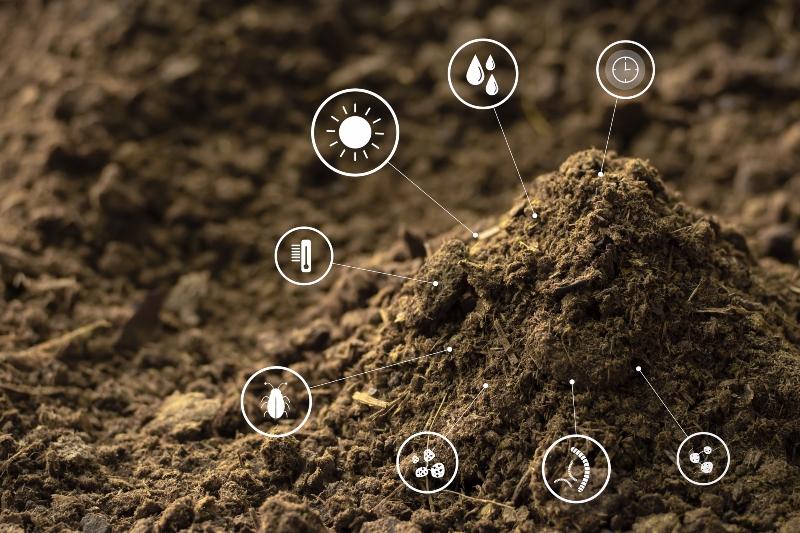Soil is the backbone of agriculture, playing a pivotal role in the growth and sustenance of crops. It acts as a natural filter for water, recycles essential nutrients to feed forests and agriculture, regulates the Earth’s temperature, and manages crucial greenhouse gases. The health of the soil directly impacts the quality and quantity of the crops it supports. A handful of healthy soil is teeming with billions of microorganisms, including fungi, bacteria, and microalgae. These microorganisms are essential in maintaining soil fertility and ensuring robust plant growth.
Healthy soil is a complex and dynamic ecosystem. It not only supports plant life but also contributes to broader environmental health. For instance, well-maintained soil can sequester carbon dioxide, mitigating the effects of climate change. Additionally, it plays a significant role in water management, preventing floods and droughts by regulating water flow and maintaining moisture levels. The intricate balance of nutrients and microorganisms in healthy soil creates a sustainable environment where plants can thrive with minimal external inputs.
The Role of Microorganisms in Soil
Microorganisms in the soil are responsible for a variety of critical functions. They break down organic matter, making nutrients available to plants, and help in the formation of soil structure, which improves water retention and aeration. Additionally, these microbes help suppress soil-borne diseases and pests, reducing the need for chemical interventions. Among these microorganisms, microalgae play a significant role in enhancing soil health by producing metabolites that stimulate microbial activity and nutrient availability.
Fungi, for example, form symbiotic relationships with plant roots, aiding in nutrient absorption and providing protection against pathogens. Bacteria contribute to nitrogen fixation, converting atmospheric nitrogen into forms that plants can utilize. Microalgae, although less commonly discussed, are equally important. They produce a range of metabolites that support the growth and activity of other beneficial microbes, creating a thriving soil ecosystem. This interconnected web of microorganisms ensures that soil remains fertile and capable of supporting healthy plant growth.
Challenges in Modern Agriculture
Modern agriculture faces numerous challenges, including soil degradation, nutrient depletion, and the increased prevalence of environmental stressors such as drought and pests. These issues not only reduce crop yields but also threaten the sustainability of farming practices. Traditional methods of addressing these challenges often rely heavily on chemical fertilizers and pesticides, which can have long-term negative impacts on soil health and the environment. There is a pressing need for innovative solutions that support soil health while promoting sustainable agricultural practices.
Soil degradation, caused by overuse, erosion, and improper farming techniques, leads to a loss of fertility and structure. Nutrient depletion means that crops receive fewer essential elements, resulting in lower yields and poorer quality produce. Environmental stressors, exacerbated by climate change, make it increasingly difficult for farmers to maintain consistent yields. Pests and diseases also become more problematic as healthy soil, which naturally suppresses these issues, deteriorates. Addressing these challenges requires a holistic approach that restores and maintains the natural balance of the soil ecosystem.
SmartSoil® Solution: Enhancing Natural Soil Activity
What is SmartSoil®?
SmartSoil® is an organic and proprietary metabolite-rich liquid derived from the cultivation of microalgae. This innovative product is designed to enhance the natural microbial activity in the soil, thereby improving nutrient availability and uptake by crops. By reestablishing the natural cycle of the soil, SmartSoil® helps create a more resilient and productive agricultural system.
Unlike traditional fertilizers that provide nutrients directly to plants, SmartSoil® works by stimulating the soil’s own ability to make those nutrients available. This approach not only improves the efficiency of nutrient usage but also fosters a healthier soil ecosystem. SmartSoil® is easy to integrate into existing farming practices, making it a practical solution for farmers seeking to enhance their soil health without significant changes to their current operations.
How It Works: Microalgae-Derived Metabolites
The foundation of SmartSoil® lies in its microalgae-derived metabolites. These metabolites are organic compounds that stimulate the activity of beneficial microorganisms in the soil. When applied, they help release, assimilate, and solubilize key nutrients, making them more accessible to plants. This process not only enhances nutrient uptake but also improves the overall health and growth of crops.
Microalgae are known for their rich composition of bioactive compounds, including amino acids, vitamins, and growth hormones. These compounds act as catalysts, boosting the activity of soil microbes and facilitating the breakdown of organic matter. As a result, essential nutrients such as nitrogen, phosphorus, and potassium become more bioavailable to plants. This increased availability means that crops can absorb nutrients more efficiently, leading to stronger growth and higher yields.
Benefits of SmartSoil®
SmartSoil® offers a multitude of benefits that significantly enhance agricultural yields and soil health.
Enriched Nutrient and Water Uptake
By making key nutrients more available to plants, SmartSoil® ensures that crops receive the essential elements needed for optimal growth. Enhanced nutrient uptake leads to healthier plants that can better utilize water, improving overall water efficiency in agricultural practices.
Efficient nutrient uptake means that plants can achieve the necessary growth and development with less input. This not only reduces the dependency on external fertilizers but also minimizes environmental runoff, which can lead to water pollution. Additionally, improved water uptake helps plants withstand periods of drought by making better use of available moisture, contributing to more resilient agricultural systems.
Enhanced Plant and Root Growth
The stimulation of natural microbial activity fosters stronger root systems in plants. Robust root growth allows plants to access nutrients and water more effectively, leading to increased biomass and healthier crops. This foundational support translates to better plant resilience and productivity.
A strong root system is crucial for plant health, as it anchors the plant firmly in the soil and facilitates the uptake of water and nutrients. Enhanced root growth also improves the plant’s ability to explore a larger volume of soil, accessing nutrients that might be out of reach for plants with weaker roots. This not only supports better growth but also contributes to the plant’s overall stability and ability to withstand environmental stresses.
Increased Microbial Growth Associated with Healthier Crops
SmartSoil® promotes the growth of beneficial microorganisms in the soil. A thriving microbial community contributes to soil fertility, disease resistance, and nutrient cycling, all of which are vital for maintaining healthy crops. This symbiotic relationship between microbes and plants creates a sustainable environment for agricultural success.
Beneficial microbes play a key role in breaking down organic matter, releasing nutrients in forms that plants can absorb. They also compete with harmful pathogens, reducing the incidence of diseases and pests. By fostering a diverse and active microbial community, SmartSoil® helps maintain a balanced soil ecosystem where plants can thrive naturally. This reduces the need for chemical interventions, promoting a more sustainable and eco-friendly approach to farming.
Increased Environmental Stress Tolerance
Crops treated with SmartSoil® exhibit greater tolerance to environmental stressors such as extreme temperatures, drought, and pests. This resilience ensures more consistent yields even under challenging conditions, providing farmers with a reliable source of income and food security.
Environmental stressors can significantly impact crop yields and quality. By enhancing the plant’s natural defenses and improving overall health, SmartSoil® helps crops better withstand adverse conditions. This means that farmers can achieve more stable and predictable yields, even in the face of climate variability and other environmental challenges. The increased resilience also contributes to long-term sustainability, ensuring that agricultural systems remain productive and viable over time.
Improved Yield
Ultimately, the combination of enhanced nutrient uptake, stronger root systems, and increased microbial activity leads to improved crop yields. Farmers using SmartSoil® report significant increases in both the quantity and quality of their harvests, making it a valuable addition to modern agricultural practices.
Higher yields not only boost farmers’ profitability but also contribute to global food security by increasing the availability of nutritious food. Improved crop quality, such as better nutrient content and reduced susceptibility to pests, further enhances the value of the harvest. These benefits make SmartSoil® an attractive solution for farmers aiming to maximize their productivity while maintaining sustainable farming practices.
Application of SmartSoil®
SmartSoil® is designed for ease of use, integrating seamlessly into existing farming operations.
How to Use SmartSoil®
SmartSoil® can be applied directly to irrigation water or added to storage tanks and mixed with other agricultural inputs. This flexibility allows farmers to incorporate SmartSoil® into their regular watering and fertilization routines without requiring major changes to their current practices.
The user-friendly application process means that farmers can adopt SmartSoil® with minimal training or disruption to their workflows. It can be used in various farming systems, including conventional, organic, and hydroponic setups. The ability to mix SmartSoil® with other inputs also means that it can complement existing fertilization and pest management strategies, enhancing their effectiveness without causing interference.
Best Practices: Pre-Treating Soil
For optimal results, it is recommended to pre-treat the soil with SmartSoil® prior to planting seasonal crops. This pre-treatment jump-starts the beneficial microbial activity, setting the stage for enhanced nutrient availability and robust plant growth throughout the growing season.
Pre-treating the soil ensures that the beneficial microbes are already active and functioning as soon as the seeds are planted. This proactive approach creates a favorable environment for seed germination and early plant development, leading to stronger and more resilient plants. Additionally, pre-treatment can help mitigate common soil issues such as compaction and poor drainage, further enhancing overall soil health and productivity.
Future Developments
SmartSoil® is committed to continuous innovation, exploring new applications for its microalgae-derived metabolites.
Expanding to Feed, Food, and Supplements
In addition to enhancing soil health, SmartSoil® is developing applications for feed, food, and nutritional supplements. By leveraging the same metabolite-rich formulation, SmartSoil® aims to provide additional benefits beyond agriculture, contributing to broader health and sustainability initiatives.
The potential applications of SmartSoil® metabolites extend into the realms of animal feed and human nutrition. Enriched feed for livestock can lead to healthier animals and improved productivity, while nutritional supplements derived from the metabolites may offer health benefits for consumers. These developments demonstrate SmartSoil®’s commitment to expanding its positive impact across multiple sectors, promoting sustainability and health from the soil up to the table.
Technological Advancements and Research
SmartSoil® continues to invest in research and development to enhance its product offerings and explore new technological advancements. By staying at the cutting edge of soil science and agricultural technology, SmartSoil® ensures that it remains a leader in the industry, consistently delivering innovative solutions to farmers’ evolving needs.
Ongoing research focuses on optimizing the production and formulation of SmartSoil®, improving its efficacy and ease of use. Additionally, SmartSoil® is exploring the integration of digital technologies, such as soil sensors and data analytics, to provide farmers with real-time insights into soil health and crop performance. These advancements aim to further enhance the precision and effectiveness of SmartSoil®, empowering farmers to make informed decisions and achieve even greater levels of productivity and sustainability.
Global Expansion and Partnerships
SmartSoil® is actively seeking to expand its global footprint by partnering with agricultural organizations, research institutions, and farmers around the world. These partnerships aim to adapt SmartSoil® to diverse soil types and farming conditions, ensuring its benefits can be realized in various agricultural contexts.
Global expansion efforts involve tailoring SmartSoil® to meet the specific needs of different regions, taking into account local soil characteristics, climate conditions, and crop types. By collaborating with local partners, SmartSoil® can provide customized solutions that address unique challenges and maximize the effectiveness of its technology. This strategic approach ensures that SmartSoil® can contribute to sustainable agriculture on a global scale, supporting farmers and ecosystems worldwide.
Conclusion: The Future of Agriculture with SmartSoil®
SmartSoil® is revolutionizing agricultural yields by restoring and enhancing the natural activity within the soil ecosystem. Its innovative use of microalgae-derived metabolites supports sustainable farming practices, improves crop health and resilience, and increases overall productivity. As SmartSoil® continues to expand its applications and support farmers worldwide, it plays a crucial role in shaping the future of agriculture, ensuring that we can meet the growing demands of a sustainable and resilient food system.
The integration of SmartSoil® into farming practices represents a shift towards more sustainable and eco-friendly agriculture. By prioritizing soil health and leveraging natural processes, SmartSoil® not only enhances yields but also preserves the vital functions of soil in our ecosystem. This holistic approach aligns with global efforts to promote environmental sustainability, reduce dependency on chemical inputs, and ensure food security for future generations.
As the agricultural landscape continues to evolve, the adoption of innovative technologies like SmartSoil® will be essential in addressing the challenges of modern farming. By empowering farmers with tools that enhance soil health and productivity, SmartSoil® supports the creation of agricultural systems that are both productive and environmentally responsible. The future of agriculture lies in sustainable practices that respect and nurture the natural world, and SmartSoil® is leading the way in making this vision a reality.
Discover how SmartSoil® can transform your farming practices and contribute to a healthier, more productive agricultural landscape.






